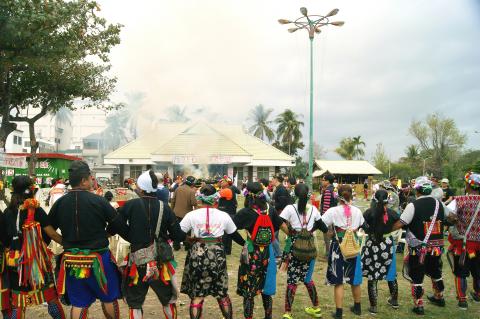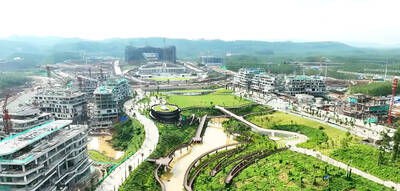Late last year, the Papulu People of Pinnyumayan were arrested and detained by police during their hunting festival, Mangayaw. On Feb. 23, people from 10 Pinnyumayan tribes and representatives from the Paiwan, Bunun and Seediq peoples gathered at the Papulu Tribe in Taitung County and practiced the ritual of sending smoke signals and firing guns in a bid to make their voices heard and protect the Indigenous peoples’ cultural rights.
Father Tai Ming-hsiung, a representative of the Lalalulan People of Paiwan, said that this was not a single problem of a particular tribe, and that the government has not educated itself about the Indigenous culture. As a result, the police find the hunting ritual of the Indigenous culture a likely violation of the law, and make arrests to meet their performance requirements. Tai says that all the Indigenous peoples from various villages should participate in the protests to educate the government. Father Kavas, a representative of the Bunun people, shouted with fury that the Indigenous peoples should express their determination to obtain autonomy by not voting in next year’s presidential and legislative elections.
Lin Chih-hsing, convener of the Pinnyumayan people’s national council, said the lack of understanding of the Pinnyumayan people in the society concerns the tribes when they engage in their cultural activities and pursue their own traditions, which shows that the indigenous peoples lack an autonomous system and the political resource to govern themselves in today’s society. That is why the Indigenous people are practicing the ritual of sending smoke signals to express their vehement protest to the government.

Photo: Wang Hsiu-ting, Liberty Times
照片:自由時報記者王秀亭
(Wang Hsiu-ting, Liberty Times. Translated by Perry Svensson)
卑南族巴布麓部落族人去年底大獵祭期間遭警拘捕移送。二月二十三日卑南族十個部落串聯,排灣、布農、賽德克族代表也齊聚台東縣巴布麓部落聲援,一起施放狼煙、鳴槍,為捍衛原住民族的文化權,向世界發聲。
排灣族拉勞蘭部落代表戴明雄牧師指出,這非單一部落問題,政府始終沒學會認識原住民文化,以致原住民從事文化狩獵活動時,警方認為有「違法空間」,為「考績」拘捕,各族群應以抗爭教育不受教的政府;布農族代表卡法司牧師則憤怒喊出二○一六年總統、立委選舉時以拒絕投票表達原住民自主決心。
卑南族民族議會召集人林志興表示,卑南族人從事文化活動,追求自己的傳統生活之際,卻因社會對卑南族的不認識,造成部落不安,顯現原住民在現今社會缺乏自主體制及自治能量,唯有透過狼煙行動,向政府表達嚴正的抗議。
(自由時報記者王秀亭)

A: Yet another shopping mall has just opened in Taipei. B: Do you mean the Mitsui Shopping Park LaLaport Nangang? A: Yeah, the shopping mall run by Japanese Mitsui & Co. opened last week. B: I hear the mall features about 300 stores, Vieshow Cinemas and Japanese Lopia supermarket. A: With the opening, a war is breaking out between Taipei’s department stores. A: 台北又有新的購物商場可逛啦。 B: 你是說Mitsui Shopping Park LaLaport 南港? A: 對啊這家日本三井集團旗下的商場上週開幕。 B: 聽說商場有威秀影城、樂比亞日系超市,還有多達300家專櫃。 A: 新商場一開幕,看來又要掀起一場百貨大戰啦! (By Eddy Chang, Taipei Times/台北時報張迪)

Indonesia is undertaking an ambitious project to relocate its capital from Jakarta to Nusantara, a new city in the province of East Kalimantan. This bold endeavor aims to address the severe environmental challenges and urban congestion plaguing Jakarta. The current capital city struggles with acute air pollution, frequent flooding, and rapid land subsidence. Experts predict that by 2050, a third of Jakarta could be submerged. The primary causes include excessive groundwater extraction and rising sea levels attributed to climate change. Moreover, with a population of over 10 million, it’s very much the economic center of the country. Unfortunately, this

A: Hey, didn’t you go to the opening of the Mitsui Shopping Park LaLaport Nangang last week? B: Yeah, there are about 300 shops, including the first overseas branch of Japan’s Mahou Dokoro — a famous Harry Potter-themed store. A: Wow, I’ve always wanted to get a magic wand. B: There are also a bunch of great restaurants, such as Smart Fish hotpot restaurant. A: I wish I had Harry Potter’s “apparition” and “disapparition” magic, so I could teleport to the mall right now. A: 你上週不是有去LaLaport南港的盛大開幕嗎?有什麼特別的? B: 那裡有多達300家專櫃,包括魔法之地的海外首店——它可是日本知名的《哈利波特》專賣店。 A: 哇我一直想買根魔杖。 B: 另外還有各式各樣的美食,像是林聰明沙鍋魚頭。 A: 真希望我也有哈利波特的「現影術/消影術」魔法,能瞬間移動到商場去! (By Eddy Chang, Taipei Times/台北時報張迪)

When it comes to movies, some people delight in watching spine-chilling horror films. Surprisingly, apart from containing a few scares, horror movies may also offer an unexpected __1__. According to a study, watching 90 minutes of a scary movie can burn an average of 113 calories, which is roughly __2__ to taking a 30-minute walk. Researchers from the University of Westminster carried out an experiment in which they __3__ participants’ oxygen intake, carbon dioxide output, and heart rates while they were watching horror movies without any distractions. The results revealed that physiological responses to fear play a crucial role